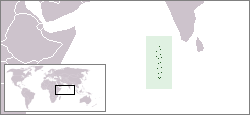Maldives: Government Gazettes Controversial New Religious Unity Regulations Bill – Analysis
By SAAG
By S. Chandrasekharan.
Last Saturday, the Government finally gazetted the controversial “New Religious Unity regulations Bill.”
The bill is supposed to control and prevent extremist and unlicensed preaching of Islam in the Maldives. The media actually describes the bill as a “crack down” on extremist preaching and not as a bill that would bring unity in a country that is hundred percent Muslim already.
The bill produced by the Ministry of Islamic Affairs of Maldives with the help of the Attorney General and the Maldives Public Services was sent to the President’s Office as early as May 6, 2010 and it took quite sometime for the President to decide on this controversial bill.

The highlights of the bill include:
- Scholars foreign or local must be licensed to preach by the Islamic Ministry and must have received at least a first degree at one of the 36 listed universities. The list will be updated from time to time. Interestingly the list includes the Jamia Darul Uloom of Deoband and six other affiliated Madrassas.
- On the delivery of the sermons, regulations include an emphasis on specifically referencing Quran when statements are made and clarifying the authenticity of Hadith.
- Preachers are not to provide information about issues disputed among Islamic scholars that serves to create disunity among the people.
- Preachers are not to preach in a manner that flaunts human dignity that may be interpreted as racial and gender discrimination, prevent people from education or health services in the name of Islam.
- Prohibits community hatred towards people of other religions, spreading a religion other than Islam and using an object that resembles a sign of a religion other than Islam. This would mean that it is an offence to preach any religion other than Islam. It is also an offence to carry or display public books on religions other than Islam and translations in Dhivehi such books and writing on other religions. These appear to be directed specially against Non Muslims who are residents, though not as citizens in Maldives.
- Foreign Scholars preaching in Maldives “should not talk against Maldives’ social norms nor should they criticise Maldives’ domestic policies and laws.”
- The media is prohibited from producing programmes, talking about or disseminating audio that “humiliates Allah or his prophet or the holy Quran or the Sunnah of the prophet or the Islamic faith.”
The most vociferous protest has come from the NGO- the Islamic foundation of Maldives. A local preacher Sheikh Fareed has described the regulations as both unconstitutional and against Quran.
A case relating to the regulations had already been filed in the High Court. One of the lawyers of the Islamic foundation argued after the gazette notification that it is in conflict with article 27 of the constitution that states that “everyone has the right to freedom of thought and freedom to communicate opinions and expressions in a manner that is not contrary to any tenet of Islam.”
As expected, the Adhaalath party that heads the Islamic Ministry has criticised the regulations on the ground that “dangerous changes” have been made from the original draft and some provisions have been added that are not “suited” to a hundred percent Islamic community. The party perhaps is peeved at the removal of the provision from the original draft that said that only “Sunni” preachers should be allowed to preach!
A former member of Special Majlis and the new Constitution drafting Committee Ibrahim ‘Ibra’ Ismail clarified that the new regulations were meant to set out a more academic approach to preaching Islam in the Maldives and were targeted at curbing the spread of extremism. He added that in has been the experience in Maldives and elsewhere that people misquote the Quran and twist it around to propagate their agenda and the provisions are meant to curb such tendencies. A provision was added that preachers avoid “hate speech” such as no one should propagate xenophobia or negative sentiments towards other religions.
It was interesting to see“varied’ views on the regulations in the media which were lively, free and thought provoking. One comment said and I quote- “Religious unity is not a requirement but the country’s unity is more important. Religion is a boat to heaven. For those who want to go fast- go get an AK 47 and go to the Afghan border. For those who want to go on a rowing boat, have your way by yourself, peacefully. For those who do not want to go- do not antagonise others- just know that others are also human beings and accommodate them within the community and expect the vice-versa” ( Ahmed Zahir)
For those who have seen uncontrolled visits of preachers and the venom that they spread, these regulations would in the short run prevent such entries or incidents. As for the larger question whether this would bring in “unity” or prevent “extremism”- it is still too early to say.
Yet, it is still a bold and a courageous move.

This is a very one-sided report by EurasiaReview.
Any child can clearly see that this ‘unity’ regulations is nothing but a disguise by extremists — which have hijacked the government — to effectively overthrow the democracy that was ushered in 2008 and turn the Maldives into a theocracy.
Independent journalists and bloggers like me are now effectively prevented from freely expressing ourselves — and this so-called ‘regulations’ also prevents minority Maldivian citizens like me from our right to freedom of religion which is guaranteed in the Koran.